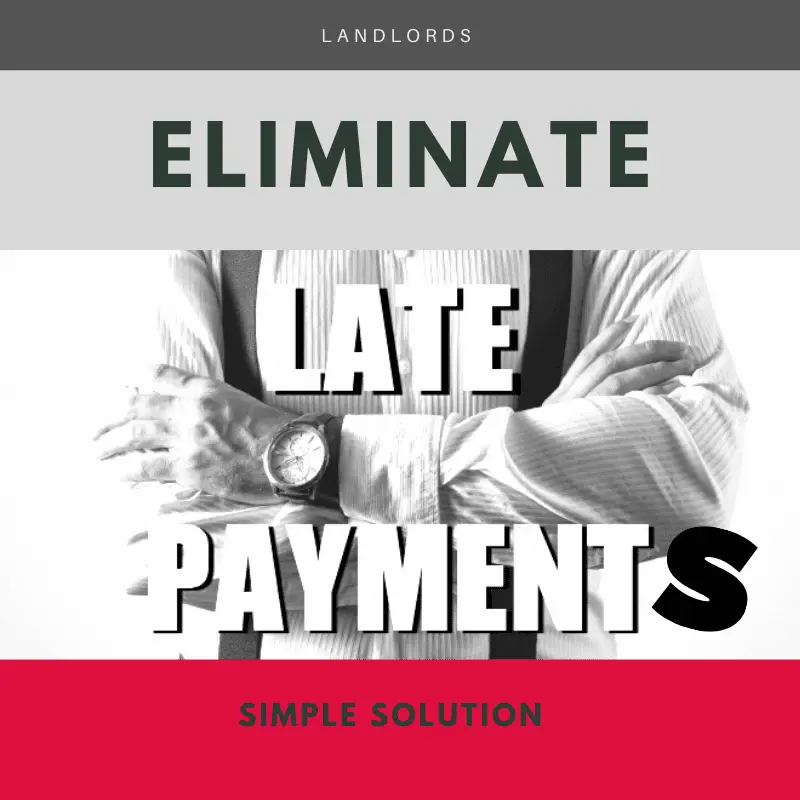
You can get everything else right, but if you don’t get paid, you will not stay in business for too long.
Tenants who pay late or simply stop paying rent are the reasons so many investors and landlords give up before they get the chance to reap the financial rewards from their rentals. The solution is simple but not easy to implement.
So, how do you prevent and deal with habitual late rent payments?
There are three proven ways to do it:
- Train your tenants at the beginning of the lease by giving them a Tenant Manual or Tenant Welcome Letter.
- Enforce the rules you’ve created. Deliver Pay or Quit Notice immediately.
- Charge late fees for late-payments and give discounts for early payments of rent.
How to Train Your Tenants to Pay On Time?
The primary tool we use to reduce late rent payments is our Tenant Welcome Letter.
This letter is an introduction of the tenants to the property, our systems, and the community in general.
A brilliant landlord once said that tenants should be treated as employees. This made a lot of sense to me because the process of introducing a new employee to a company is very similar to the orientation we do with a new tenant.
You can watch the video below if you want to check out everything that’s included in our Tenant Welcome Letter.
We usually meet with tenants when they move in. We show them how everything works, and we go over our Tenant Welcome Letter.
Part of this letter is our Late Rent Payment Policy. In it, we explain when the rent is due when it is late and our policy on rent payment. We also make it clear that if the rent is not paid by a specific date, they should expect a Pay or Quit Notice.
We also make it clear that we don’t make any exceptions because that will be considered discrimination. We can’t treat one tenant differently from another just because we think they have a better reason for being late.
Since we started doing this, we don’t get any phone calls or emails with excuses.
Our tenants know the guidelines and what’s expected from them.
Enforcing the Rules

Do you remember when you were a kid, and your mom punished you for not doing your homework one day, and the next day she didn’t even ask?
Maybe your mom was more consistent than mine.
In my case, I tried to test her and see how many days in a row I can get away without doing homework.
Some of your tenants will test the limits as well. If you told them that you deliver Pay or Quit Notices on the 7th, but you didn’t, I can almost guarantee that they will do it again and again until it becomes a habit that’s very difficult to break
My mom probably felt bad about continually reminding me about homework, so she didn’t do it every day.
Landlords and property managers have a good excuse too. Delivering Eviction Notices doesn’t feel right, but it’s crucial to growing a healthy rental business.
If you currently have a tenant who pays habitually late, mail them a Late Rent Payment Warning Letter.
If they don’t respond to that, deliver a Pay or Quit Notice immediately the next time they are late with rent.. In Florida that’s a 3 Day Notice.
Discounts for On Time Payment and Late Fees

The “carrot and stick” method of motivation has been used since the industrial revolution.
The carrot is the discount for early payment, and the stick is the late fees.
I only use carrots for my dog Kimmy; see photo above, and not for my tenants.
I don’t use discounts for early payment as a reward, but many landlords swear by it. The reason I don’t like it is that I don’t want tenants to think that paying on time is optional and that they should be rewarded for it.
What I use is Late Fees and Notice Delivery Fees.
A couple of things about late fees:
- Include all fees in your lease.
- Charge reasonable late fees.
- Give tenant grace period even if not required by law.
The fees should be written in your lease agreement.
You can’t charge tenants’ late fees even if they are reasonable if they are not mentioned in the lease.
Have a grace period
If your state has no statute on the required grace period before charging late fees, it’s a good idea to give tenants at least three days.
The reason for that is you want to be able to enforce and collect late fees. If you are unreasonable, for example charging a 10% late fee on the first day after the rent is due, this may become a burden for them, and they will resent you for it.
Be fair but consistent.
Charge reasonable but sizable late fees to motivate tenants and stay legal.
What is a sizable but reasonable fee depends on the rent amount.
What would motivate a tenant who is paying $1500? I believe $20 is not enough to encourage them to pay on time. However, 7% might be enough a deterrent to stop late payments.
Daily Vs. One-Time Late Fees
Your state laws determine the late fees you can charge. In general, you can charge three types of late fees:
-One time late fee
-Daily fees
-One time fee plus daily fees
One time fee plus daily fees encourage the tenants to pay ASAP even if they are late one day. If there are no daily fees, the tenants wouldn’t have the motivation to pay immediately.
Notice Delivery Fee
I charge $100 for the delivery of a Pay or Quit Notice. I started doing that after we had a tenant who will only pay after we delivered a notice. Running to her house every time the rent was late, become tiresome very quickly.


